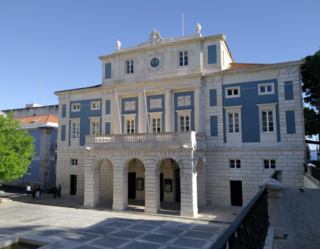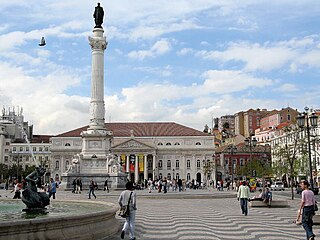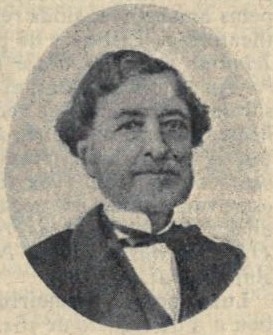
The Most Serene House of Braganza, also known as the Brigantine dynasty, is a dynasty of emperors, kings, princes, and dukes of Portuguese origin which reigned in Europe and the Americas.

The Teatro Nacional de São Carlos is an opera house in Lisbon, Portugal. It was opened on June 30, 1793 by Queen Maria I as a replacement for the Tejo Opera House, which was destroyed in the 1755 Lisbon earthquake. The theatre is located in the historical center of Lisbon, in the Chiado district.

The Rossio is the popular name of the King Pedro IV Square in the city of Lisbon, in Portugal. It is located in the Pombaline Downtown of Lisbon and has been one of its main squares since the Middle Ages. It has been the setting of popular revolts and celebrations, bullfights and executions, and is now a preferred meeting place of Lisbon natives and tourists alike.
José Pedro Gomes is a Portuguese actor, author and theatre director.

Paulo Szot is a Brazilian operatic baritone singer and actor. He made his opera debut in 1997 and his international career has included performances with the Metropolitan Opera, La Scala di Milano, Opera de Paris, Bayerische Staatsoper, Opera Australia, Liceo de Barcelona, among many others. In 2008, he made his Broadway debut as Emile De Becque in a revival of South Pacific, for which he won the Tony Award for Best Performance by a Leading Actor in a Musical, the Drama Desk Award, the Outer Critics Circle Award and the Theatre World Award. In 2012 he was nominated for a Laurence Olivier Award for best actor in a musical, and in 2014 was nominated for the MAC Award for best Celebrity Artist becoming the first Brazilian to receive such honors. In 2022, he originated the role of "Lance" in the hit Broadway musical & Juliet.

The São Pedro Theatre is the oldest theatre in the city of Porto Alegre, the state capital of Rio Grande do Sul, Brazil.

Teatro São Pedro(English: São Pedro Theater) is located in São Paulo, Brazil. It was created by the Portuguese Manuel Fernandes Lopes and inaugurated on January 20, 1917 with the performances of the plays A Moreninha and O Escravo de Lúcifer. It is the second oldest operating theater in São Paulo.

Eva Sopher was a Brazilian theatre manager in Porto Alegre. She renovated the São Pedro Theatre and ran it for 41 years.

Emília das Neves was a Portuguese actress. She is considered to have been the most notable Portuguese actress of her time and be the first great female star to emerge in Portugal.

Lucinda Simões was one of the most acclaimed Portuguese actors and theatre directors in the late 19th and early 20th centuries. The former Teatro Lucinda in Rio de Janeiro was named after her.

Lucília Simões was a Brazilian-born Portuguese actress, stage director and impresario.

Ângela Rita Clara de Almeida Pinto was a Portuguese actress of the late 19th and early 20th centuries.

Carolina Falco was a 19th-century Portuguese actress, dancer and singer, who became famous in both Portugal and Brazil.

Ana Cardoso was a 19th-century Portuguese actress.

Lucinda do Carmo was a Portuguese actress in the 19th and 20th centuries who performed in all theatrical genres.

Manuela Rey was a Galician theatre actress who found success on the Portuguese stage.

Carlota Talassi was a Portuguese actress and translator of plays.

Émile Doux (1798–1876), known in Portugal and Brazil as Emílio Doux, was a French theatre actor, director, playwright and impresario in Portugal and later in Brazil.

On the night of 15 July 1889, an attempt was made on the life of Emperor Pedro II of Brazil in the Constituição Square in Rio de Janeiro. Adriano Augusto do Valle, a Portuguese immigrant, shot at Pedro's carriage while shouting in praise of the republic. The shots missed and do Valle escaped, though he was later captured.

The Teatro D. Fernando was a theatre in the Portuguese capital of Lisbon between 1849 and 1860.


















